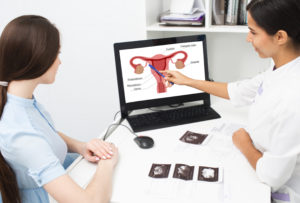Abnormal Uterus Shapes
Even though they are not very common, some women are born with an abnormal uterus, including a defect in the size, shape, or structure of the uterus. The two most common types are called heart-shaped uterus and tipped uterus.
What is commonly referred to as a heart-shaped uterus is actually a “bicornuate uterus.” It occurs when the fallopian tubes come together on top of the main uterine cavity and form a shape that resembles a heart. Romantic as this may sound, uterine irregularities may cause complications during pregnancy.
A tipped uterus (officially referred to as a retroverted uterus) is a type of uterus that tilts in a backward position at the cervix instead of forward. A tipped uterus can either be a variation of pelvic anatomy by birth, or it can develop as women mature. Less romantic-sounding than the heart-shaped uterus, a tipped uterus may also be the result of pelvic scarring or adhesions.
Symptoms
Neither condition has particularly noticeable symptoms, and both are usually determined when women get either a pelvic exam or an ultrasound. Common symptoms of an abnormal uterus include the following:
| Heart-Shaped Uterus | Tipped Uterus |
| Irregular vaginal bleeding | Lower back pain during intercourse |
| Repeated miscarriages | Trouble inserting tampons |
| Painful periods and abdominal discomfort | Increased urinary frequency and UTIs |
| Pain during intercourse | Protrusion of the lower abdomen |
Keep in mind that in the case of a heart-shaped uterus the symptoms may not feel out of the ordinary, as you have most likely had it your whole life.
Causes
Women with heart-shaped uteri are born this way, so the cause is simply the way the uterine cavity and fallopian tubes are shaped. However, a tipped uterus is not always a birth defect and its possible underlying causes warrant attention:
- Endometriosis: endometrial scar tissue or adhesions may cause the uterus to stick in a backward position.
- Fibroids: uterine fibroids can cause the uterus to tilt backward.
- Pelvic Inflammatory Disease (PID): if left untreated, PID can cause scarring that has a similar effect to endometriosis.
- History of pelvic surgery or prior pregnancy: in both, or either, case the ligaments that hold the uterus in place can become stretched/ scarred and cause the uterus to tilt backward.
Pregnancy and Fertility
In the case of a heart-shaped uterus, the chances of conceiving do not become less, nor is your fertility affected. It has, however, been suggested that this uterine shape is more common in women who are infertile.
A heart-shaped uterus increases the chances of a miscarriage in the later stages of a pregnancy, or an early delivery of the baby. These cases are connected to either reduced uterine capacity or irregular uterine contractions. Additionally, babies born to mothers with a heart-shaped uterus are four times more likely to develop birth defects. It is also more likely that you will have to give birth via a C-section.
Though a tipped uterus does not affect a woman’s ability to conceive, it is often connected to other conditions that may lead to fertility issues. These include endometriosis, pelvic inflammatory disease (PID) and fibroids. When necessary, infertility treatments such as intrauterine insemination (IUI) or in vitro fertilization (IVF) assist women with these diagnoses to achieve pregnancy.
More

